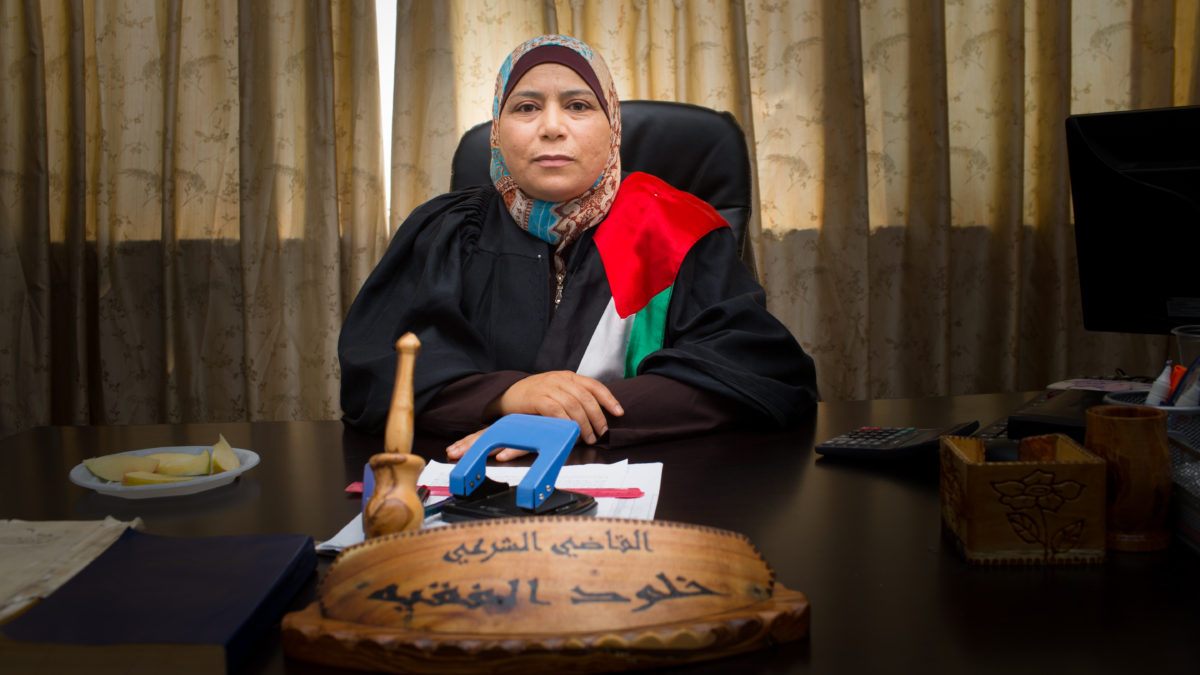
Erika Cohn’s very sympathetic profile on Khoulud Al-Faqih who became the first woman appointed to be a Judge in a Palestinian Shari’a Court in the West Bank bravely attempts to uncover some of the mystique and secrecy that cloaks this Islamic culture. Most of the time she succeeds exceptionally well, but on some occasions, she never follows through on some of the more surprising revelations, like the fact that her goatherder father managed to pay to put Al-Faqih and all her eleven siblings through University
Al-Faqih trained as a lawyer and although she would qualify to be a judge in the regular Palestinian Courts she set her sights on the Shari’a Courts which practice the religious law which forms part of the Islamic tradition. They are the only Courts that can deal with family matters and divorce. She lobbied the progressive Chief Justice, Sheikh Tayseer Al-Tamimi and persuaded him not only of her qualifications but of her right under Islamic law, to be appointed to the Bench.
Cohn does a street pop vox to monitor the general response to Al-Faqih’s somewhat revolutionary appointment which is met with a fair mixture of skepticism. This, however, is far more positive than the ultra-conservative Dr. Husam Al-Deen Afanah, a recognized Palestinian professor, and Islamic scholar. Dr. Afanah is a strong believer in gender roles, and some of his deeply held views on women in society, in general, throw a light on the major obstacles they still face in this patriarchal culture.
AS the camera trails closely behind her we see a very confident Al-Faqih dispense justice in her small courtroom ensuring that marital separations and divorces are handled fairly. No easy task when the law that is generally weighted against women and allows a man to take up to four wives, also says sexual abuse and non-consensual sex in a marriage is not rape.
However as soon as she starts to establish a reputation in the Shari’a Court, the Sheik is suddenly replaced, and his more traditional successor reduces the role of Al-Faqih and her Court to purely be administrators from now on. This she does reluctantly until he too is replaced and Al-Faqih’s position is restored.
The cameras follow her to her home too which she shares with her lawyer husband and four young children. With no visible signs of any support system, she reverts to being a traditional wife and mother, except that she has told her husband in no uncertain terms that she will never agree to him taking on more wives.
Al-Faqih creates a very quiet but powerful presence wherever she is. She uses her seemingly inexhaustible amount of charm and patience to help her achieve her goals. Dressed head to toe in traditional garb, she looks like the most unlikely feminist, but in her very subtle determined way, you know she will move mountains if it helps her to continue to ensure that women in her society start to get dealt a fairer hand.
There is another surprising element to this film which managed to get cameras into places they have never been allowed before in Palestine, and it is the fact that director Erika Cohn is an American Jew.

